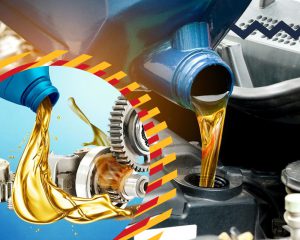Industrial oils Industrial oils A) Circulating and hydraulic oils: • Hydraulic and circulating fluids (in different types and properties)• Fire resistant hydraulic fluids (in different types and properties)B) Turbine oils: These oils are suitable for use in gas, steam and water turbines, combined cycles of power plants, gas transmission pipelines, etc.C) Industrial gear oils and […]
Car lubricants Engine oils A) Motor oils of gasoline cars (in different types and properties) B) Diesel car engine oils (in different types and properties) C) Rail motor oils (in different types and properties) D) Marine engine oils: Motorboat Cylinder (two-stroke) System (two-stroke) Trunk-piston (medium speed) E) Gas and dual fuel engine oils (in different […]
Engine oil (industrial and non-industrial) Engine oil (industrial and non-industrial) Engine oil is based approximately 90% on (heavy) paraffinic hydrocarbon, which is distilled from crude oil. The other 10% is additives. The length of hydrocarbon chains varies depending on the expected properties of the oil, but the base reserves generally consist of a set of […]
Base oil Base oil To produce oil, we need a raw material called base oil, which is either virgin or recycled from used oil. Base oils can be divided into 3 categories: mineral, synthetic and semi-synthetic. Mineral base oil Crude oil reaches boiling point after entering the refining stage. The result of this refinement will […]




